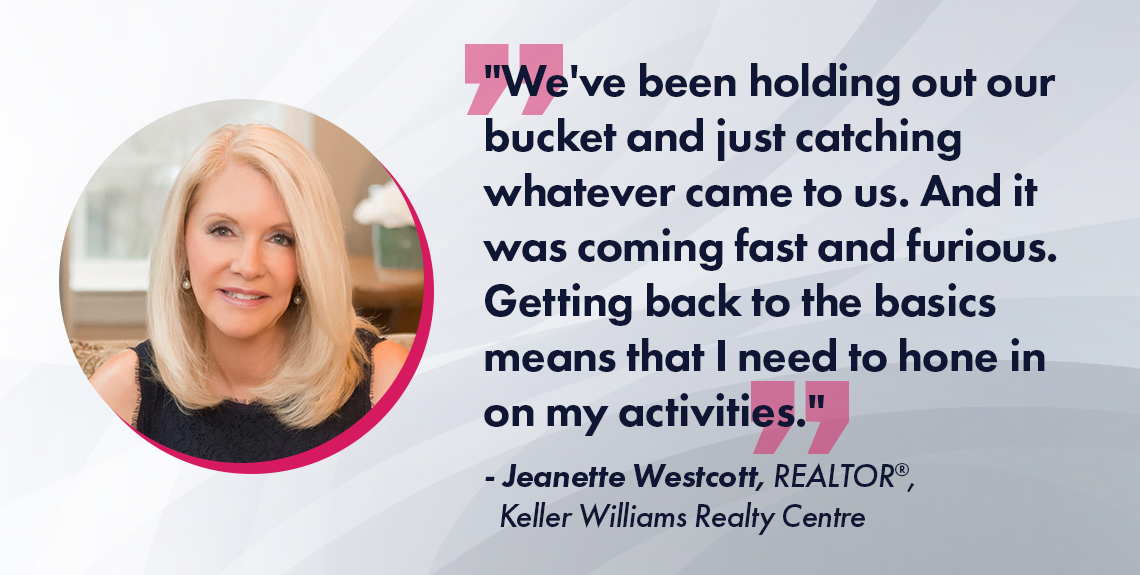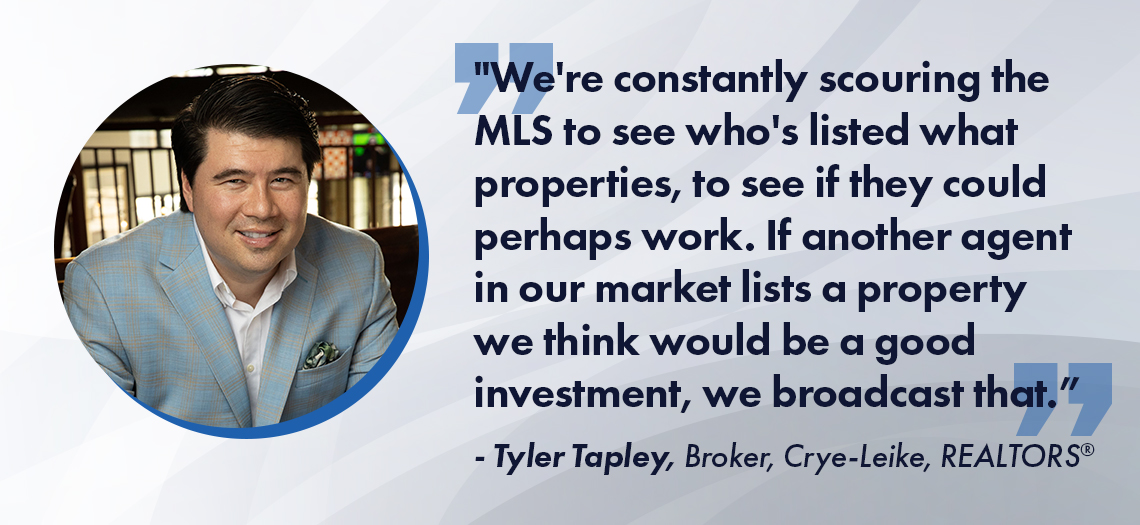In real estate (and most every other profession), those who have a mastery of the fundamentals will always outperform those who dabble. Thus, a successful 2023 and beyond will require a purposeful, tangible focus on scheduling, training and practice.
It should not be an issue for most REALTORS®. Why? Because they’re already used to not getting paid unless they close a deal. That said, now is the time to reassess what work days look like, and knowing what is most important in order to succeed. The many thousands of agents bailing on the business are almost exclusively the ones who had it easy the last few years, when a listing became a sale within days. The true pros remain. We’re back to normal now, and back to basics.
“We can’t change the past. We can only change what’s going forward,” says Creig Northrop, founder and CEO of Northrop Realty in Clarksville, Maryland. “And by doing that, we have to start looking at what got us to where we are, and where we’re going to go. What back to basics means to you and your business is one of the relevant questions that all of us as REALTORS® need to start asking ourselves.
“I think face to face is the key that we’re lacking right now. We’ve forgotten how to have conversations because we’ve been texting and emailing and Zooming so much. Great markets make weak agents, and I think skillset is going to shine more.”
Jeanette Westcott, a REALTOR® with Keller Williams Realty Centre in Columbia, Maryland, notes that the last two years have been more about lead-receiving versus lead-generating, and that needs to change.
“We’ve been holding out our bucket and just catching whatever came to us,” she admits. “And it was coming fast and furious. Getting back to the basics means that I need to hone in on my activities. I need to start calling and texting and having face-to-face conversations, and making sure that I’m having more conversations when I’m actually lead-generating versus just lead-receiving.”
Reconnecting With Partners
Mark Balestracci, team leader of the Balestracci Group at Lamacchia Realty in Worcester, Massachusetts, acknowledges that while his group has always focused on their clients—and will continue to do so—one of the things they want to get back to is their referral partners.
“Our vendors, the people who have also been instrumental in building our business, getting face to face with them again, inviting them to our client events,” he says. “Think of home inspectors, what they went through the last two years, and how we can help their business so they can help ours. Same thing with our lenders, attorneys and title companies. Just reaching out and building that database. One of the things I used to do when I started was add two names a day into my database, and I got away from that many years ago. We’re going to get back into that so we can build a quality database again.”
Tyler Tapley, a broker with Crye-Leike, REALTORS® in Memphis, Tennessee, explains that part of his company’s back-to-basics strategy is talking to loan officers and finding out if they have special financing available. The thinking is that it helps listings sell faster in this market.

“At least for owner-occupants, they can get loans without mortgage insurance,” he says. “It’s cheaper than renting and helps our inventory sell quicker. I have spent the last year getting my broker’s license, so it’s back to the basics, but it’s also about furthering education. We’re trying to do a better job communicating with our vendors and contractors, but also our buyers and sellers.”
Northrop agrees, particularly with the education aspect.
“Learn more, earn more,” he says. “Training now takes advantage of the time you have. We all wanted more time, now we have the time, but sometimes don’t know what to do with the time. One of my agents said they feel like a real estate agent again. I love that because I think we’re needed more now, and we’ve always wanted that. Get back in front of your clients. Put that value proposition back into what we have taken for granted because it’s been such easy pickings.”
Getting back to the office seems like a simple thing, but first the pandemic and then the slowdown caused a lot of agents to work remotely more and more. Returning to a formal place of business every day is something more and more real estate professionals are doing.
“I’m at the office every morning at 7:30 no matter what,” Tapley points out. “And I come to the office on Saturdays and Sundays. One thing we all do is read the property transfers in the local paper…who bought, where they bought, and what they paid. We do that because maybe there was a listing we tried to get but didn’t. We want to see who bought it.
“We have a lot of pocket listings that we’re constantly trying to see who’s buying, and what they’re paying. Maybe there’s a fix and flip. We’re constantly scouring the MLS to see who’s listed what properties, to see if they could perhaps work. If another agent in our market lists a property we think would be a good investment, we broadcast that, we share that. We have about 475 buyers and sellers throughout the world who are actively buying and selling in this market, so that’s what we’re doing every day.”
Northrop tells the tale of one agent in his office who “turned tears to cheers” by returning to the office on a regular basis.
“She didn’t know where her business went, but it started coming around when she got back to the office,” he says. “Being in the office is a mindset itself. There’s no distractions, nothing personal. When I’m home, I like to snack. I don’t need anymore snacks. I need to go in and get more things done in the office.”
Westcott is also an early-in advocate, arriving around 7:30 every morning because that’s when she feels she works best.
Open Houses Back in Favor
“I’m very focused on working high-level open houses now, for both buyers and future listings,” says Westcott. “I’m doing a lot of circle prospecting, and teaching my current database how to refer to me. For a long time I didn’t really have to do that. I stayed in touch with them, but for the past couple of years it just flowed. Now I’m teaching them how to refer to me. I’m working FSBOs and expireds, and I’ve gotten back to farming. I was very good at farming a couple of very specific neighborhoods, and I’ve taken them back again.”
Northrop began his career in open houses, and still believes in them as being very valuable.
“It’s what your mindset is about open houses,” he says. “It’s not about the number of people that come through; it’s the quality of the people that come through. And I think sometimes we get caught up on the number. Just like I told our agents when offers came in, I don’t care how many you got on a property because you’re going to scare off the others. You might as well just say you got one offer on the property, because that’s all that really matters.”
Balestracci posits training as something his company is stressing.
“We’re diving into it,” he exclaims. “I don’t feel we can get enough training. At least myself, I picked up a lot of bad habits. I need to unlearn some of the things that I was doing over the last two years and get back to what made me successful the previous 18 years. One is becoming the market expert again, knowing every piece of inventory, whether it’s sold, active or under agreement. I think those are the things that help us become trusted by our clients, but also the people that we’re talking to.
If someone’s at an open house and says, ‘You know what, Mark? This isn’t for me. Do you have another one that meets the same criteria?’ If I don’t know that answer, then I’ve lost that prospect. But if I can answer that, we can have a great conversation and I can potentially land that person. It’s getting back to knowing everything I need to know about my local market that I really didn’t focus on the last two years.”
Northrop notes that limited inventory in many places has made it less of a challenge for agents to know about everything available. “It’s easy right now to learn your inventory while it’s low,” he adds. “It’s a lot easier to grow with your inventory, learn the properties, go preview them, because business begets business.”

Balestracci agrees that inventory is low, and one of the answers to getting traction is to improve marketing efforts.
“We’re not historically low like we were a year ago, but we’re not much higher,” he admits. “We still have people sitting on the sidelines, and I don’t see that changing right away, so we’re trying to get more consistent with marketing. We’ve partnered with a company that has a big brand recognition throughout the state. On a local level, our team is working on some different strategies. We just took out our first billboard, and that has generated a lot of social media buzz from past clients and people reaching out to us. We also do a lot of hyperlocal marketing with schools, Little League baseball teams, things that have helped us grow our personal listing inventory. We’re hoping that will help get people off the sidelines.”
Marketing is often something REALTORS® stop doing when things are going well, confesses Northrop. “We kind of take it for granted,” he says. “There are three things I used to always see when closing a sale. You have to care, you have to be consistent in your marketing, and you have to be confident.”
Tapley’s company is trying something new: going after commercial and multi-family listings.
“I know most agents don’t know anything about that. I recommend you do research and due diligence. We’ve made a concerted effort to seek out new opportunities or new listings such as that,” says Tapley, who listed a gas station for $800,000.
“One of the ways you can do that without the education is to partner with another agent who has it as their primary focus. Maybe start going after some large land listings, and instead of just paying a referral fee and moving on, maybe you say, ‘Hey, can we work together on this?’ We’ve taken on apartments, duplexes, things of that nature. It doesn’t cost anything to try.”



